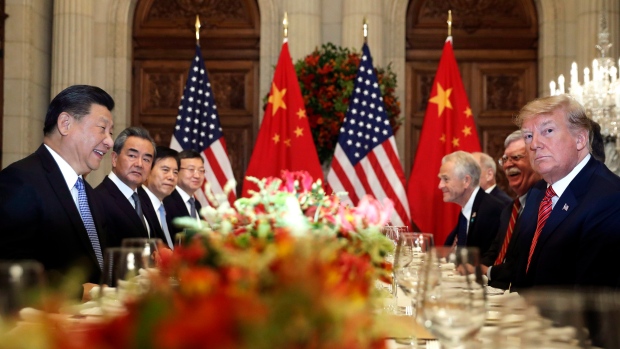US, China revive trade talks with low hopes for progress
Mon 29 Jul 2019, 16:23:36

Two months after US-Chinese talks aimed at ending a tariff war broke down, both sides are trying to temper hopes for a breakthrough when negotiations resume Tuesday on an array of disputes that has grown to include tension over Chinese tech giant Huawei.
Rhetoric on both sides has hardened despite the agreement by Presidents Donald Trump and Xi Jinping in June to revive efforts to end the costly fight over China's technology ambitions and trade surplus.
"I don't know if they're going to make a deal," Trump said Friday. "Maybe they will, maybe they won't. I don't care."
He repeated his claim that the United States is prospering by "taking in tens of billions of dollars" from his tariff hikes on Chinese products.
In reality, those are paid by US companies and consumers who buy Chinese goods.
Mnuchin and Trade Representative Robert Lighthizer are due to meet Tuesday and Wednesday in Shanghai with a delegation led by China's economy czar, Vice Premier Liu He.
Chinese leaders are resisting US pressure to roll back plans for government-led development of industry leaders in robotics, artificial intelligence and other technologies.
Washington complains those efforts depend on stealing or pressuring foreign companies to hand over technology.
Some American officials worry the US is losing its lead.
For their part, American negotiators have resisted Beijing's demand that they remove all punitive tariffs immediately.
Washington wants to keep some in place to ensure China keeps its promises.
"The same issues that caused the talks to break down are still there," said Julian Evans-Pritchard of Capital Economics.
"Neither side seems any closer to offering major concessions," said Evans-Pritchard.
"It's very hard to see how they can reach a deal this time if they were unable to do that in March."
US priorities include "industrial policy issues such as intellectual property rights, forced technology transfer and subsidies for (Chinese) state-owned enterprises," said Jeff Moon, a former US diplomat and trade official who specialized in China.
"Enforcing any agreements is also a top priority."
The June agreement to resume negotiations helped to calm jittery financial markets despite warnings by economists that with both sides still far apart on critical issues, the fragile truce likely will soon fall apart.
Tensions worsened when, after talks broke down in May, the Trump administration imposed curbs on US technology sales to Huawei, the biggest global maker of network gear for phone companies and the No. 2 smartphone brand.
US officials view Huawei as a national security threat and warn that its equipment could be used for cyberespionage.
Beijing retaliated by announcing it would create its own list of
"unreliable entities" subject to unspecified controls. Authorities have yet to announce which companies might be targeted.
"unreliable entities" subject to unspecified controls. Authorities have yet to announce which companies might be targeted.
Trump has suggested he would consider easing up on Huawei if it meant getting a better trade deal.
"Trump — in his eagerness to find negotiating leverage — linked national security and trade with regard to Huawei to create a new bargaining chip," Moon said.
Members of Congress from both parties likely would object to any concessions on Huawei.
The tariff hikes are battering exporters on both sides and disrupting trade in goods from soybeans to medical devices.
China's imports of American goods fell 31.4 per cent in June from a year ago while exports to the United States fell 7.8 per cent.
US Treasury Secretary Steven Mnuchin is usually upbeat in public about the talks.
But he tried to temper hopes when he announced plans for the Shanghai meeting, telling broadcaster CNBC that negotiators face "a lot of issues" and he expects to hold more talks, probably in Washington.
"China and the United States will face tough negotiations. The gap between their current positions is very big," said the Global Times, published by the ruling Communist Party newspaper People's Daily.
Washington "still hopes to force Chinese concessions," the newspaper said.
It rejected "destructive surgery on China's economic system" and called on Washington "not to deny the legitimacy of China's demands."
China agreed earlier to narrow its multibillion-dollar trade surplus with the United States by purchasing more American soybeans, natural gas and other exports. But it revoked that pledge after one of Trump's tariff hikes last year.
Chinese leaders have grown more skittish, saying any agreement must be "balanced," reflecting frustration that American officials would portray the talks as a victory for Washington, with China bearing the costs.
"If the responsibilities all come from China, it is not an agreement but a surrender," said Tu Xinquan, director of the China Institute of International Trade and Economics.
Moon, who runs the China Moon Strategies consultancy, dismissed Beijing's call for balance as "an excuse to object to reforming even the most protectionist aspects of China's trade policy."
Trump's demands for changes in Chinese industrial policy strike at the heart of a state-led development model the ruling Communist Party sees as a path to prosperity and greater global influence.
The decision to add Huawei Technologies Ltd. To a US "entity list" that limits exports threatens China's first global tech brand.
Huawei, which reported USD 105 billion in sales in 2018, relies heavily on US components and technology.
Its founder said losing access to them could cut its projected revenue by USD 30 billion over the next two years.
No Comments For This Post, Be first to write a Comment.
Most viewed from International
Most viewed from World
AIMIM News
Latest Urdu News
Most Viewed
May 26, 2020
Do you think Canada-India relations will improve under New PM Mark Carney?
Latest Videos View All
Like Us
Home
About Us
Advertise With Us
All Polls
Epaper Archives
Privacy Policy
Contact Us
Download Etemaad App
© 2025 Etemaad Daily News, All Rights Reserved.

.jpg)
.jpg)
.jpg)






.jpg)


.jpg)
.jpg)
.jpg)
.jpg)
.jpg)
.jpg)
.jpg)
.jpg)
.jpg)
.jpg)
.jpg)
.jpg)

















